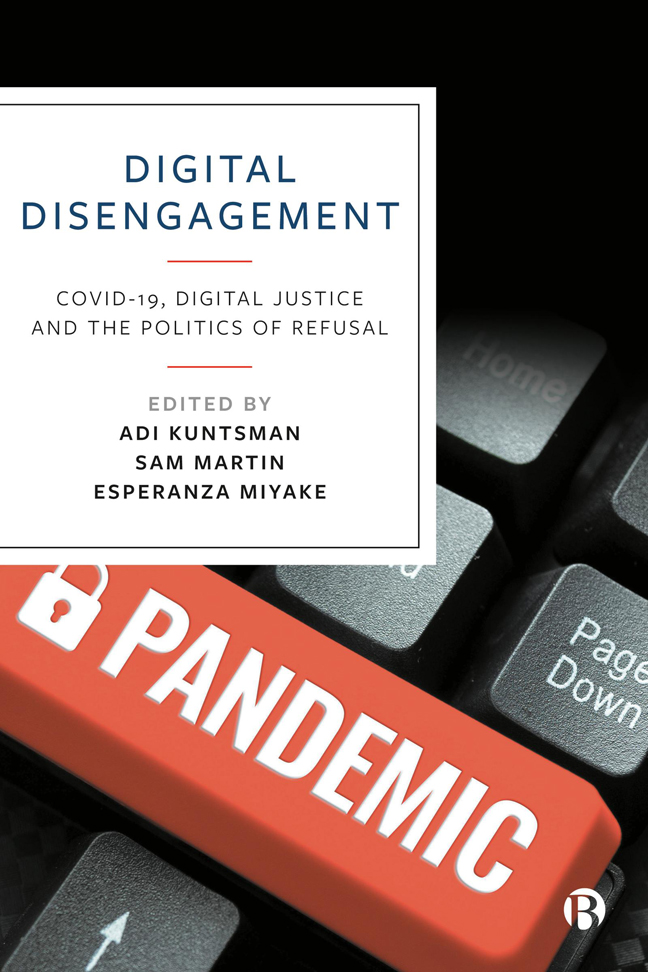Book contents
- Frontmatter
- Contents
- Notes on Contributors
- Introduction
- One En/forcing the Tokyo 2020 Olympics: The Racialization of Digital Engagement and Digital Solutionism
- Two Digital Engagements and Work–Life Balance in Creative Labour
- Three ‘#RoeVsWadeOverturned: Any Idea How Fast Your #PeriodtrackingApp Can Lead To Jail?’: Digital Disengagement and the Repeal of Roe vs Wade
- Four #SnailMailRevolution: The Networked Aesthetics of Pandemic Letter-Writing Campaigns
- Five Data Minimalism and Digital Disengagement in COVID-19 Hacktivism
- Six Digital Solutionism Meets Pandemic Imaginaries
- Seven State Violence, Digital Harms and the COVID-19 Pandemic: Imagining Refusal, Resistance and Community Self-Defence
- Epilogue: Digital Disengagement – Questions of Pandemic and Post-Pandemic Digitalities
- Index
Two - Digital Engagements and Work–Life Balance in Creative Labour
Published online by Cambridge University Press: 25 January 2024
- Frontmatter
- Contents
- Notes on Contributors
- Introduction
- One En/forcing the Tokyo 2020 Olympics: The Racialization of Digital Engagement and Digital Solutionism
- Two Digital Engagements and Work–Life Balance in Creative Labour
- Three ‘#RoeVsWadeOverturned: Any Idea How Fast Your #PeriodtrackingApp Can Lead To Jail?’: Digital Disengagement and the Repeal of Roe vs Wade
- Four #SnailMailRevolution: The Networked Aesthetics of Pandemic Letter-Writing Campaigns
- Five Data Minimalism and Digital Disengagement in COVID-19 Hacktivism
- Six Digital Solutionism Meets Pandemic Imaginaries
- Seven State Violence, Digital Harms and the COVID-19 Pandemic: Imagining Refusal, Resistance and Community Self-Defence
- Epilogue: Digital Disengagement – Questions of Pandemic and Post-Pandemic Digitalities
- Index
Summary
Introduction
The rapid change and transmission of communication technologies have transformed our interaction types and engagement styles on digital media parallel to social, political, cultural and economic relationships. As there is a dialectic relationship between cultural, social and daily life and digital transformation, the concept of digital engagement as a complex phenomenon requires consistent re-evaluation/re-thinking as for concepts such as digital economics, labour politics and inequality issues (Kuntsman and Miyake, 2019). In addition, as a result of the COVID-19 pandemic starting in 2020, the general population had to adapt to a new way of life, primarily because of the reduction of face-to-face communication, socialization and other physical interactions. The pandemic dramatically affected the social life and work practices of the general population. This game-changing situation created a need for more comprehensive and multidimensional approaches to communication studies, specifically the practices of digital (dis)engagement. The pandemic had worldwide socio-cultural impacts, but these new adaptations to social life and work culture also depended on national policies. Nations’ COVID-19 regulations are mainly driven by their economic and technological capacities.
When the first COVID-19 case in Turkey was announced on 11 March 2020, the public and private sectors had already shifted to a flexible working system. Businesses with a small number of personnel in the workplace provided flexibility to their staff through remote working options. By 11 April, Turkey had announced a total lockdown for its citizens. Some measures, including the curfew, were taken by the government at various intervals, considering some factors such as seasonal conditions, holidays, age group, location, etc.
A year after the first COVID-19 case, Turkey was in 5th position in the world in terms of the number of cases that had been seen, and in 19th position in terms of mortality caused by COVID-19. During this period, the government tried to minimize the adverse economic effects of COVID-19 by providing low-interest loans or various support packages to its citizens. However, this period has been considered the biggest economic crisis era after World War II by the president in terms of it its outcome (Timeturk, 2020). In this period, when life was housebound, creative industries that used digital technologies at the centre and did not necessarily rely on a workspace or the physical presence at the office of the employees, brought workspaces to homes.
- Type
- Chapter
- Information
- Digital DisengagementCOVID-19, Digital Justice and the Politics of Refusal, pp. 38 - 60Publisher: Bristol University PressPrint publication year: 2023

